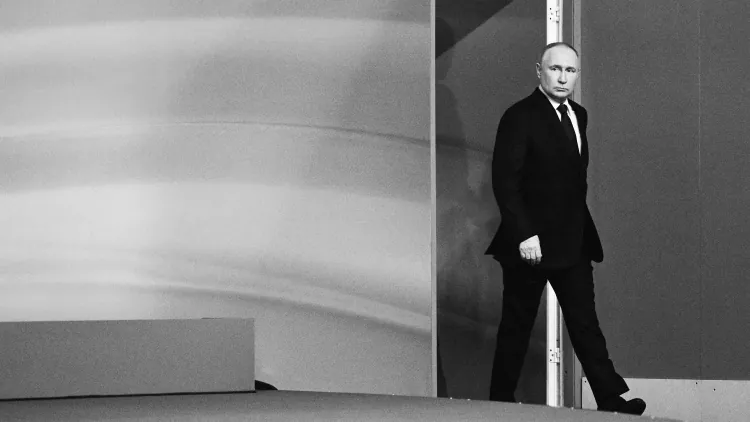There Was No Russian Election
Vladimir Putin staged an elaborate charade—so why did some western media outlets play along?

There was no election in Russia last weekend. There was no campaign. There were no debates, which was unsurprising, because no issues could be debated. Above all, there were no real candidates, bar one: the president of Russia, Vladimir Putin, the man who has just started his fifth, unconstitutional term in office.
Russians did line up at polling stations, but these were not actually polling stations. They were props in an elaborate piece of political theater, a months-long exercise in the projection of power and brutality. While that exercise unfolded, Putin’s only significant political opponent, Alexei Navalny, died under mysterious circumstances in a prison north of the Arctic Circle. Two Russian presidential candidates collected the requisite number of signatures to stand, both said they opposed the war in Ukraine, and both were removed from the ballot. Three practically unknown people were allowed to remain on the ballot, but they did not criticize Putin and did not oppose him in any way. One of them declared that he hoped Putin would win. In Russian-occupied Ukraine, men in balaclavas forced people to vote at gunpoint.
Some Western media nevertheless covered this orchestrated drama as if it really were an election. Reporters interviewed voters, cited “exit polls,” even commented on the “results,” as if these things mean anything in a country whose leadership lies openly about everything: economic statistics, war casualties, Russian history. Reuters ran a headline declaring Putin had won “in a landslide.” The earnest coverage was exactly what Putin hoped he would get. He knows, after all, that he is an illegitimate leader, and he knows that he abandoned the Russian constitution. This non-election was his messaging exercise, designed to show Russians, and the rest of the world, that he intends to stay in power anyway, illegally. He especially needs the foreign press, which is widely and frequently quoted inside Russia, to help him demoralize his internal opposition and frighten external opponents. Foreign recognition gives him the legitimacy he craves.
[Anna Nemstova: Putin’s ‘rabble of thin-necked henchmen’]
This grotesque charade was in addition a form of distraction, because Putin also knows that his war in Ukraine is an ongoing disaster for Russia. The number of dead, wounded, and missing Russian soldiers now exceeds 315,000. The Ukrainian military claims that there were nearly 6,000 Russian casualties just last week. The Russian navy has lost several ships to Ukrainian drones, and has now retreated from the western part of the Black Sea. The Russian air force has lost several planes to Ukrainian missiles just in the past month, and the army, hundreds of tanks. Ukrainian sabotage and drone strikes have now hit multiple Russian oil refineries, cutting production by as much as 10 percent. Putin needs to deflect Russian attention, and our attention, away from all of these fiascos. Once again, foreign press coverage helps, especially in the United States, where Russian money, Russian propaganda, and Russian influence in the congressional Republican Party have successfully held up military aid for Ukraine for more than half a year. Putin isn’t winning in the Black Sea, but he can win in Washington, if only he can inject a bit more hopelessness and helplessness into the American debate.
Finally, Putin has a more universal goal: By holding this non-election and calling it an election, the Russian regime mocks democracy itself. Putin’s critics want political alternatives, not just a different leader. They use the language of democracy and rights. Navalny once spoke of a “virus of freedom” that spreads rapidly and cannot be snuffed out. Putin needs to halt this virus, undermine this language, kill off any hope that Russia could ever be a different kind of place.
He also needs to eradicate the virus of freedom everywhere else that it flourishes, in order to prevent it from reinfecting Russia. On Sunday, this dictator who murders his opponents commented on Donald Trump’s legal troubles, which he described as the “use of administrative resources” against him. “The whole world is laughing at it,” he said. Trump is accused of breaking multiple laws in multiple states—while in business, while president, and even since he left office. By describing him as a victim of political persecution, Putin demeans the very idea of rule of law, and supports the Trump campaign at the same time.
In the Cold War era, this form of argumentation was known as whataboutism: deflecting criticism of your own system by attacking someone else’s. Back then, we recognized this verbal game and we had some resistance to it. Not all of us do anymore. We might have to relearn the games played by dictators—and we can start by calling things by their real names. So I’ll say it again: There was no election in Russia last weekend. Putin did not win. His regime is so brittle that it arrests and fines people who are overheard criticizing the war in restaurants, persecutes people for laying flowers on Navalny’s grave, orchestrates ostentatious shows of support. And someday it will be gone.
What's Your Reaction?




















